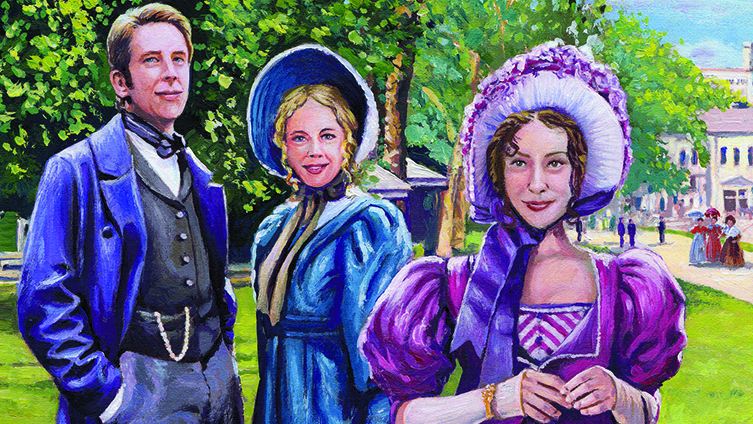On Distant Shores – Episode 20

Isabel! Margaret sailed into the drawing-room with her usual graceful flourish, kissing her sister-in-law on both cheeks before gesturing for her to sit in one of the chintz-covered chairs by the fireplace.
“I’ve asked Clara to bring tea,” she said, sitting across from Isabel and arranging her skirts around her. As usual, Margaret looked lovely and vibrant in the latest fashion, her sleeves flaring to the elbow and then tight to the wrist. Her hair was arranged in a sleek chignon, with clusters of curls dancing at her brow. She smiled merrily. “I have had such pleasant news. My niece, Maggie MacDougall, will be coming to stay with me while Henry is away. She is to arrive at the end of the week.”
“Mother told me,” Isabel murmured. “It is indeed pleasant for you to have company at this trying time.”
Margaret cocked her head, her eyes bright with speculation.
“Indeed. Pray forgive me if I am speaking out of turn, but dear Isabel, you do look a little peaked.”
“Do I?” Isabel tried to smile, although she had hardly felt anything close to happiness since her father had forbidden her to put her name on Mr Anderson’s list a week ago. She had attempted to talk to him again, and he had been quite severe with her. Her mother she had not dared speak to at all, for her stony expression was far too forbidding.
Clara bustled quietly in with the tea tray, giving Isabel enough time to gather her courage and tell Margaret of her plan – her last hope.
“If truth be told,” she said, taking a sip of tea, “I have had quite a bit on my mind this last week.”
Margaret’s expression sharpened with interest and Isabel saw her sister-in-law’s eyebrows arch over the rim of her tea cup.
“Have you?”
“Yes, indeed.” Isabel set her cup down. “I’m sure you can appreciate, Margaret, that my lot these last ten years has not been an easy one.”
Margaret’s expression sobered and she set her tea cup down as well.
“The life of an unmarried woman is never easy,” she agreed quietly, “although I would think the First School would afford you some pleasure as well as purpose.”
“It does,” Isabel assured her. Margaret had started the school, and though with Charlotte she had too many cares to continue, Isabel knew the cause was still dear to Margaret’s heart. More dear than it was to her own. “But I confess, I do not relish a continued life of teaching and living at my parents’ home.”
Margaret considered the matter for a moment.
“Perhaps there are more options available to you than you might realise,” she said finally. “Women are able to accomplish far more now than they used to. Why, look at Elizabeth Palmer Peabody, who helped to start the Temple School with Mr Bronson Alcott, and only this year she has started her Foreign Library, run out of her very own living-room!”
Isabel managed a tight smile.
“Her parents’ living-room, I believe.”
Although she had never met Miss Peabody, Isabel was well acquainted with the woman’s rather notorious exploits. The Temple School was considered liberal enough to have become ridiculous, and the Peabodys were caught up in the recent fashion of transcendentalism, which Isabel’s far more conservative parents would never condone.
“Still, Doctor Channing himself reads the paper there, and lawyers and professors.”
“I have no wish or talent to start a salon,” Isabel interjected flatly. “The First School’s more modest aims are more to my liking.”
“Yet you do not wish to continue?”
Isabel suppressed a sigh. This conversation was not going as she had hoped or planned. She knew Margaret possessed more intellectual curiosity than she did. Her sister-in-law sometimes socialised with the less radical of the transcendentalists, and enjoyed discussing a variety of topics from poetry to politics. Meanwhile, Isabel acknowledged grimly, she simply wanted to marry.
“It is not that I wish to stop teaching,” she finally said, “but that I wish for more.”
Margaret wrinkled her brow in confusion.
“More?”
“Yes. More.” Why, Isabel wondered, was it so hard for her family to understand? Were they simply so cushioned from the reality of a life of loneliness, with their spouses and children? Did no-one understand how she felt? She took a deep breath.













